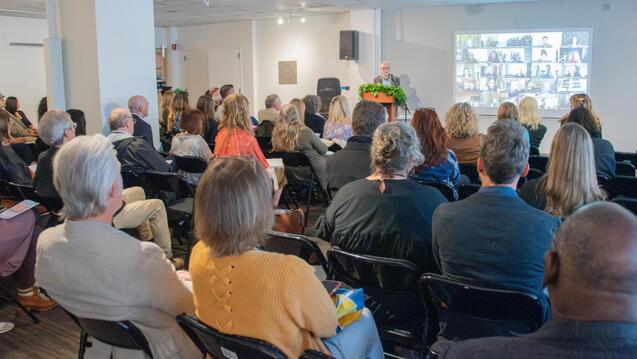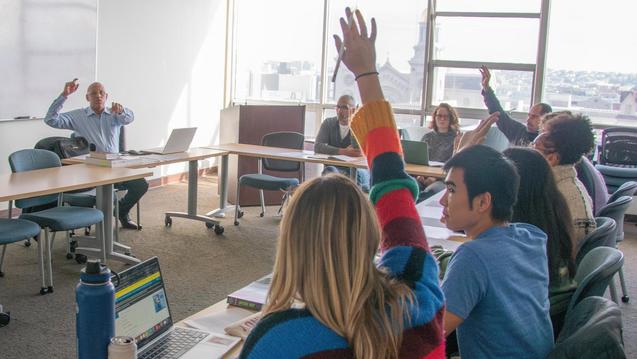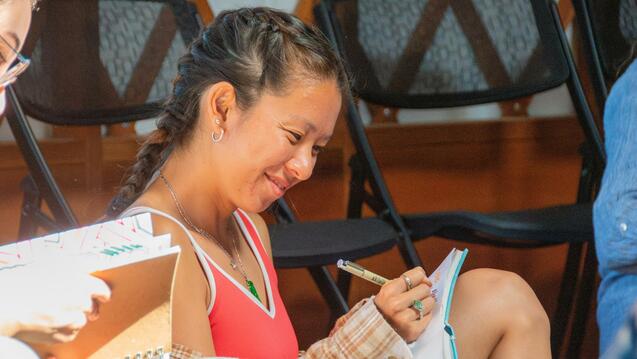Over 370 participants gathered at CIIS to honor Jung’s 150th birthday in a transformative exploration of psyche, purpose, and collective healing.

Mental Health Project Inspires Hope
In the Bay Area, our need for increased and better quality mental health services is urgent
In the Bay Area, our need for increased and better quality mental health services is urgent--and with it, the demand for qualified therapists and counselors who can provide those services.
Thanks to the Mental Health Services Act (MHSA), or Proposition 63, San Francisco's public mental health system has received significant funding to expand services. Passed by a 54% majority of California voters in 2004, with strong support from state mental health associations and the large urban areas of San Francisco and Los Angeles, the Act imposes a 1% tax on personal income above $1 million.
In fiscal year 2013-14 alone, MHSA was projected to generate more than $21.2 million for San Francisco County.
In 2006, the San Francisco Public Health Department awarded CIIS more than $1 million over six years to create the MHSA Project (the Project) in order to increase the number of students from underrepresented groups who enroll in the School of Professional Psychology.
As Director of the Project at CIIS, I am afforded the power and resources to inspire populations that have been historically viewed as recipients of services to join the workforce as highly skilled, licensed mental health professionals-effectively helping to transform the public mental health system.
The Project at CIIS attracts and retains at least 15 new additional students each year from racially, ethnically, and linguistically diverse communities, as well as students who identify as Lesbian Gay Bisexual Transgender Queer (LGBTQ), and people with lived experience with, or family members involved in, the mental health care system.
We endeavor to achieve this goal through community outreach, public events and expanded student services, such as career and academic advising, skill building, time and stress management, and resource referrals. In addition, we offer students and faculty professional workshops and training related to current issues of diversity, inclusion, and social justice within the field of psychology.
In March, the Project received the City and County of San Francisco Department of Public Health's highest rating of "4 - Commendable/Exceeds Standards."
Student-Centered Support
Tupi Worku, a first-year student in the Community Mental Health program, is a self-identified Tongan- Ethiopian-black man. He knows what it's like to live in an immigrant community and in a family that doesn't have adequate support services. "There's a lot of isolation and loneliness, and you feel like your problems are your own," he says.
Tupi wants to become a therapist because his community is suffering from the impact of health disparities, racism, and poverty. "I see myself as a bridge. There's something special about having access--not just to systems, but access to knowing
Despite his lifelong commitment to social change and health equity, Tupi struggled to make the decision to earn a master's degree in counseling psychology at CIIS. "It's difficult to be a student in mental health when you come from a community where you feel you don't have a voice or that you matter. I had a lot of self-doubt and needed to feel that I belonged."
Fortunately, from the moment he decided to apply, Tupi connected with the Project through a peer referral. Thus far, he's benefited from individualized career counseling, admission to special events, textbook loans, and assistance completing a successful application for practicum training at a San Francisco County-funded mental health site.
The good news is that all counseling psychology students can take advantage of our services, and as Project Coordinator Sandi Esquivel points out, "we have the greatest impact when we can work with students from the moment they arrive, or even before." As a former student (Somatic Psychology '12), she now publicizes valuable resources and opportunities that students probably wouldn't know about otherwise. "It's essential that our students connect with people who care about them and who want them to succeed."
According to Steven Tierney, Chair of the Counseling Psychology program, the Affordable Care Act has made access to mental health services possible for many people from diverse communities. "At CIIS," he says, "the MHSA Project works in the community to increase awareness of the potential benefits of psychotherapy for individuals, families, and communities.
"Most importantly, through outreach, training, and support, the Project makes students from those communities feel welcome, included, and ultimately successful. This relatively small project is having a major impact on Bay Area mental health," he adds,
We're enrolling future clinicians who will serve as leaders and change agents within the system, and we're inspiring our students with a diversity of ideas and analyses in the classroom.
Transformation at Every Level
Though not every student in our clinical programs is seeking a career in public mental health, most will in fact earn their clinical hours toward licensure by working in a public or community-based organization. According to a recent survey of counseling psychology alumni, more than 70% are employed or volunteering at local agencies, at K-12 schools, and in the juvenile and adult prison systems.
MHSA promotes a community psychology orientation with an approach grounded in the belief that people can and do get better, and exit the mental health care system. It's essential that our students, the majority of whom will be trained in public systems-understand the need to be responsive to diverse perspectives about mental illness, and to respect interventions based on the cultural and spiritual values of the communities they serve.
At CIIS we're helping to create a new generation of clinicians who can provide therapy based on wellness and recovery; we're enrolling future clinicians who will serve as leaders and change agents within the system; and we're inspiring our students with a diversity of ideas and analyses in the classroom. Perhaps most critical to our work is that we have begun, with faculty, to change the curriculum of psychology to include theories and models from people of color, LGBTQ authors, as well as indigenous perspectives on mental illness.
Community Mental Health student Adilia Torres says that participating in the MHSA Project has taught her "how to work with my Latina/Chicana and Queer communities-especially how to integrate the cultural and spiritual aspects of our beings, like self-testimonials, which is a part of our medicine." As a clinician, she says, "You can't dismiss the intersectionality of the whole person."
Stigma Ends With Me
Students from marginalized communities and with disabilities are vulnerable targets for microaggressions in academic and professional settings; discrimination and fear of being stigmatized often silence their voices in the classroom and beyond.
I still remember, when I was a Community Mental Health student at CIIS, the conflicting feelings I experienced when I realized that I could now diagnose my entire family-including myself-from the DSM-IV Manual.
While it felt powerful to be able to label suffering, it also brought up anger and generations of stigma and shame. I had to learn to quickly navigate between the opposing worlds of diagnosing and being diagnosed.
Today, in my role as MHSA Project Director, I have the unique opportunity to model resiliency for my students by speaking openly about my lifelong relationship with trauma and depression. I believe it is empowering for students to have a mentor who recognizes their human challenges as well as their healing potential.
Like me, students are coming to CIIS with their own experiences-or as the family member of someone-in the mental health care, social service, and prison systems. They hope to return to their communities as therapists because they have survived the harmful effects of oppressive systems, racism, ableism, and homophobia.
Remember Why You Came Here
For Expressive Arts Therapy student Kami Cheatham, a Native American (Chahta) and African American- identified woman, the impact of peer support "has been massive." Kami, who already works as a peer provider for Pathways to Discovery, a Community Behavioral Health Services program, believes that the compassionate support she receives from the Project gives her the added strength to be successful in graduate school.
"No matter what challenges I've had in my wellness and recovery, I feel empowered as a future clinician that I'm not relegated to one level of service. All the MHSA Project folks inspire me with hope that I can also be an instructor, a researcher, and a writer," Kami says.
In order to fully realize its vision, the Project facilitates spaces where students can openly discuss how to navigate their responses to the internal and systemic stigma and discrimination issues endured by marginalized communities within the field of psychology. We also support student-led affinity groups, such as Queer@CIIS, Transgress, Women of the African Diaspora, the Expressive Arts Salon, and POC Thrive with supplemental funding and supplies.
Embrace the Uncomfortable
That CIIS addresses these issues head-on is why Community Mental Health student Solymar Negrón chose to earn her counseling psychology degree here and not elsewhere. "We have adapted to, but haven't been trained in, wellness strategies rooted in who we are as a people in a hybrid, gentrified society," she says. "At CIIS I'm able to develop my own models and to be with a cohort of solid, like-minded people who think differently about how to bring wellness back to our communities."
Another way the Project is having an impact is by supporting faculty and staff in gaining the skills they need to engage in difficult conversations. In Fall 2014, we invited nationally recognized psychologist, speaker, and author Dr. Ken Hardy to work with CIIS staff and faculty over a three-day period.
Hardy appreciated the commitment and curiosity of the people he interacted with toward issues of diversity and inclusion, calling it "an honor and a privilege to be a part of your community these past several days.
"It is rare that I visit any educational institution where members of the faculty are willing to meet after 5 p.m., or where the president clears his schedule to attend a three-hour meeting devoted to diversity and inclusion," he says. "Both occurred at CIIS!"
Related Academic Program
Master of Arts in Counseling Psychology with a Concentration in Community Mental Health
Related News
Your roadmap to becoming a licensed clinical psychologist through CIIS' integral, holistic approach to doctoral training and professional practice.
Discover your fit among CIIS' five counseling psychology concentrations, each offering a unique path to becoming a transformative healer.



